-
Welcome to Real Parenting, a space where parents can share the joys, pain, and the mess of parenthood. Want to get something off your chest? Share your parenting journey? Email us at smartparentingsubmissions@gmail with the subject “Real Parenting.” Click here to read more ‘Real Parenting’ stories.
After watching too many Korean dramas, have you ever wondered what it’s like to live in any city in South Korea? Prior to moving to the country’s capital, Seoul, in 2013, mom of two Edellyn Amba-Lee’s idea of the Korean lifestyle was gleamed from watching K-Dramas.
“In some ways, it’s different, and in some ways, it is exactly like in the dramas,” she shares in an interview with SmartParenting.com.ph.
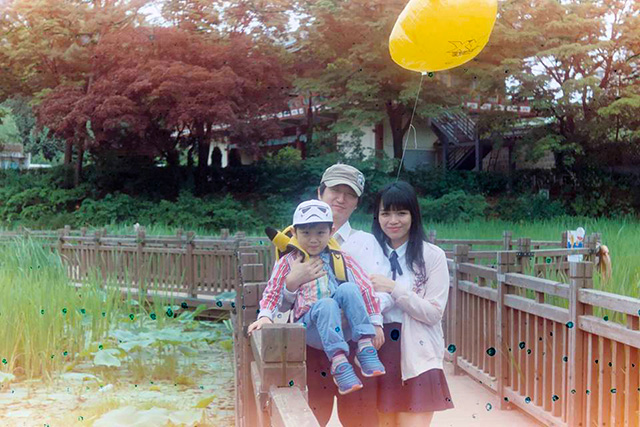 Edellyn, Demian, and Subin at Grand Children’s Park in Seoul.PHOTO BY Edellyn Amba-Lee
Edellyn, Demian, and Subin at Grand Children’s Park in Seoul.PHOTO BY Edellyn Amba-LeeEdellyn and her Korean husband Demian Lee got married and welcomed their first child, Subin, in Manila before moving to South Korea’s capital. Since she’s not yet fluent in the language, Edellyn had to study Korean at Edae Women’s University for free as part of the immigrant program of the government. “It was definitely challenging to be a first-time parent while simultaneously adapting to a new language and culture,” she recalls.
ADVERTISEMENT – CONTINUE READING BELOWAside from juggling all these changes, she also had to navigate the ups and downs of parenting, making sure she and her husband take into consideration both Pinoy and Korean values.
Understanding Korean traditions, keeping Filipino values intact
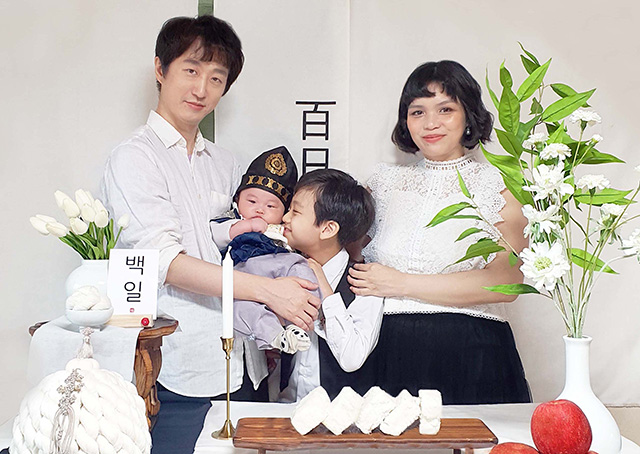 Kona’s baek-il (first 100 days). The couple’s youngest child was born in Spring, 2021.PHOTO BY Edellyn Amba-Lee
Kona’s baek-il (first 100 days). The couple’s youngest child was born in Spring, 2021.PHOTO BY Edellyn Amba-LeeAccording to Edellyn, Koreans are big on traditions — from naming the children to attending after-school activities. In deciding the name of the baby, Filipinos often consider naming the kids after ancestors or taking inspiration from a name the parents love.
“In Korean culture, ‘dolimja’ is followed. It’s a generations name or character where babies from the same generation in a family share a character in their names,” says Edellyn.
For their children’s names, the couple followed another tradition — using a Cheol Hagwan, wherein a specialist recommends names based on the birth date and time of the baby to ensure prosperity and well-being.
CONTINUE READING BELOWRecommended Videos“The fee starts at $50 and can go up to $400,” she shares. “We were given two to three options for names and we chose according to the meaning of their hanja (traditional writing system consisting of Chinese characters). Subin’s hanja means ‘bright or sparkle,’ and Kona’s, our youngest, hanja means ‘gift from the heavens,’” she adds.
In addition to finalizing the name of their kids, the couple also follows Korean ceremonial rites when it comes to celebrating milestones. Koreans have baek-il, which celebrates a child’s first 100 days, and doljanchi or first birthday.
“The baby wears traditional clothes or hanbok and specific foods have to be offered and served. There are also rites performed with the baby,” Edellyn shares.
A gold ring that symbolizes wishing the baby good health is considered a traditional gift for such occasions which the parents keep. These rings are then melted into the child’s wedding ring when he or she comes of age.
Beyond naming the child and important occasions, Koreans also put importance on instilling healthy habits and values to the young. “ All Korean kids go to hagwon or after-school classes like Kumon, taekwondo, sports, and musical instrument classes. These are common classes children take starting from pre-K,” says the mom of two.
According to Edellyn, hagwon culture is definitely one of the biggest differences between Korean and Filipino upbringing. “Korean parents always want their children to be ahead, to guarantee their success in life,” she says.
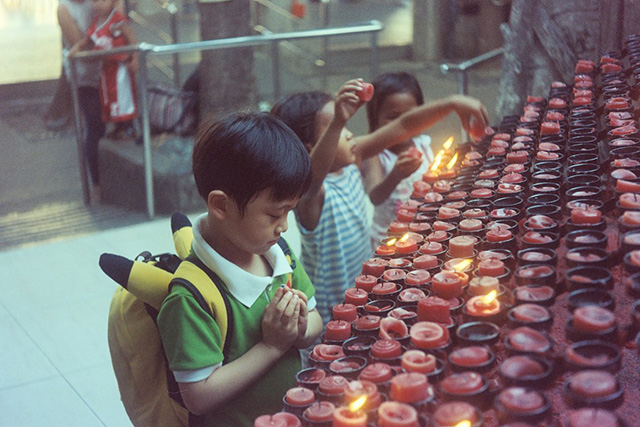 Subin saying a prayer. Edellyn says she wants the kids to grow up prayerful.PHOTO BY Edellyn Amba-LeeADVERTISEMENT – CONTINUE READING BELOW
Subin saying a prayer. Edellyn says she wants the kids to grow up prayerful.PHOTO BY Edellyn Amba-LeeADVERTISEMENT – CONTINUE READING BELOWWhile their eldest used to go to hagwons pre-pandemic, the couple agreed that they want their child to develop good study habits so he can study even without adult supervision. To do this, they got him a tablet so he can study his additional lessons like Kumon at his own pace.
They allow Subin to make his own schedule which include when he will study and when to take a break. “We want to promote a mindset that learning is fun and at the same time, honor his childhood by letting him be a child and enjoy playing,” Edellyn explains.
Korean kids are also taught about the concept of “nunchi,” which a journalist refers to as “the secret to raising smart and successful kids.” Nunchi is the art of sensing what other people are thinking and feeling before responding correctly.
According to an article on CNBC.com, “this type of upbringing is meant to teach children that the world doesn’t revolve around them.” Suffice to say, the concept focuses on understanding that not everything is about you. As a foreigner in South Korea, Edellyn admits that nunchi is something she also had to learn.
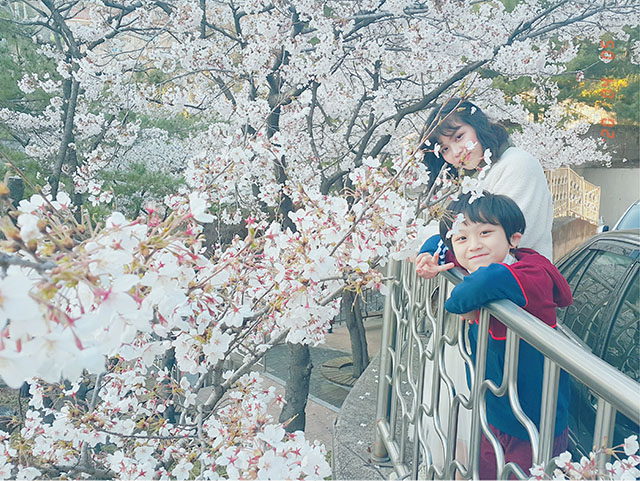 Edellyn and Subin, Spring 2019.PHOTO BY Edellyn Amba-LeeADVERTISEMENT – CONTINUE READING BELOW
Edellyn and Subin, Spring 2019.PHOTO BY Edellyn Amba-LeeADVERTISEMENT – CONTINUE READING BELOWThe mom of two also makes sure her kids grow up to be resilient, resourceful, and prayerful like Pinoys. “Filipinos and Koreans share a lot of core values like filial piety, politeness, and gratitude,” she says.
In terms of learning the Filipino language, the couple wants to make sure the kids learn not just Tagalog, but English and Japanese as well since the family speaks these languages, too.
Raising kids in South Korea
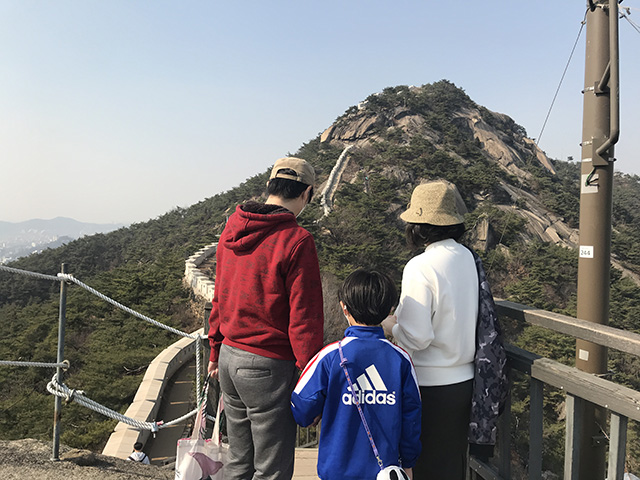 The family enjoys going on long walks and hiking behind their apartment village.PHOTO BY Edellyn Amba-Lee
The family enjoys going on long walks and hiking behind their apartment village.PHOTO BY Edellyn Amba-LeeLove the neighborhoods you often see in K-Dramas? Edellyn says that Seoul is a kid-friendly city. Families get financial support from the government from pregnancy up to middle school, plus, there are many activities to enjoy.
 The hiking view in Seoul.PHOTO BY Edellyn Amba-LeeADVERTISEMENT – CONTINUE READING BELOW
The hiking view in Seoul.PHOTO BY Edellyn Amba-LeeADVERTISEMENT – CONTINUE READING BELOW“On days when my husband and I are not busy, we take long walks or go hiking behind our apartment village. We fish in the streams during summer and go sledding in the winter — all in the vicinity of our neighborhood,” Edellyn shares.
What she loves best about living in Seoul is mobility is not limited by car. They can walk to and from must-visit places when the weather is nice, plus, there are museums that specifically cater to children.
The best part? Most spaces have no entrance fee or only asks for a minimal fee. “Most of our expenses are on food. We can also focus on our activities without worrying about the traffic going home or going overbudget,” she relates.
Parenting is teamwork
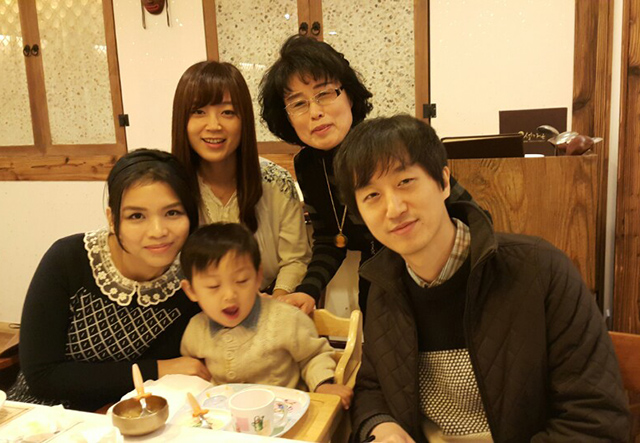 The then family of three with Demian’s family.PHOTO BY Edellyn Amba-Lee
The then family of three with Demian’s family.PHOTO BY Edellyn Amba-LeeTeamwork is indeed at play in the Lee household since both Edellyn and Demian are working from home as freelance designers. They make work and managing the household chores a team effort but they also value the help they get from family members.
ADVERTISEMENT – CONTINUE READING BELOWAside from Edellyn’s mother-in-law pitching in from time-to-time, they also make the most of the subsidized daycare services from the government. Edellyn’s mom also calls the family often and sends care packages while friends are just a message away.
It’s easy to assume that just because parents come from different cultures, raising children would be double the challenge. For the Lees though, knowing what they value the most makes it easier.
“We always put our children’s well-being first, regardless of what culture and traditions dictate,” says Edellyn. Disagreements are inevitable in any relationship, what’s important is you resolve conflicts and always think about the welfare of the kids.
Read how other Pinoy families are raising kids in other countries here.
Pinay Mom On How She’s Raising Kids To Respect Filipino And Korean Values And Traditions
Source: Progress Pinas
0 Comments